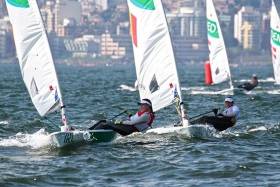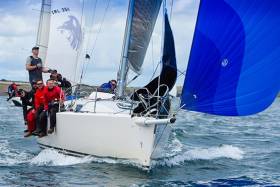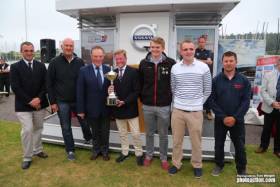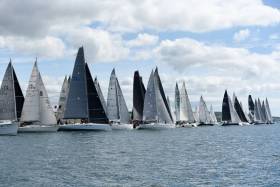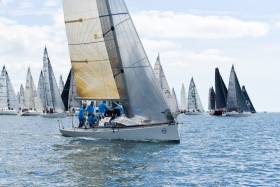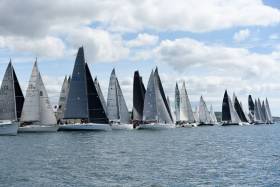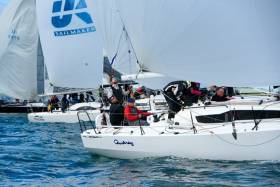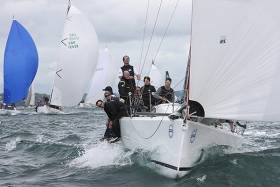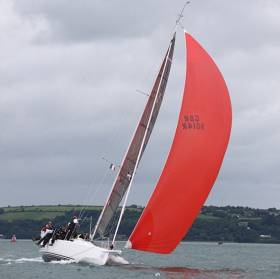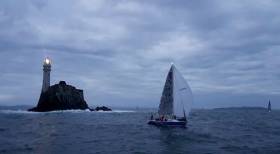Displaying items by tag: Cork Week
It’s indicative of the pace of Irish sailing in 2016 that for anyone taking an overview, it takes a bit of an effort to remember what the weather was like for much of our spring, summer and autumn. Admittedly, here in Afloat.ie we may skew recollections, as we’ll always go for a sunny photo or video if at all possible. Yet the cascade of memories of success and memorable events at home and abroad has been at such a pace that even if the sun wasn’t shining or the wind wasn’t obliging, the recollections are good. W M Nixon tries to make sense of the highlights.
If 2016 wasn’t the greatest Irish sailing season ever, then we’ll be happy to take on board proposals arguing the case for other years. And in the fantastic golden year of 2016, the supreme moment was on the evening of Tuesday August 16th, when the entire nation at home – or at least the entire sailing nation – was glued to a television screen of one sort or another, following every twist and turn for Annalise Murphy in the brief but intense drama of the final Olympic Medal Race for the Women’s Laser Radials on the flukey yet undeniably glamorous waters off Rio de Janeiro.
As the weeks and months have passed since, we’ve forgotten that for Annalise to win the Silver Medal, it was a pilgrimage of sorts to put right the pain of missing out so closely on a medal at the 2012 Olympics. We’ve also forgotten that the tension was exacerbated by the fact that the Medals Race should have been held on Monday August 15th, but was blown out to cause an agonizing 24-hour postponement. And we’ve largely forgotten that only three months earlier, the prospects hadn’t seemed at all good for Ireland’s best hope, with a poor performance at the Worlds in Mexico.
Yet we remember just enough of that situation to put into perspective the ten weeks transformation that Annalise wrought within herself. With her dedicated support team, she ensured that she’d become a hugely improved sailor, a fitter athlete and psychologically in a very good place, as she took on the Olympic challenge on August 8th with a cool confidence which in due course received its proper reward.
Thanks to the close focus which was put on the outstanding Murphy medal, we are well aware of the breadth and depth of the backup team which helped to make it all possible. But in the end it was just one lone sailor entirely on her own who was trying to carve out the right route through extraordinarily difficult sailing conditions, racing against the very best in the world. So it is entirely right and proper that Irish sailing will remember 2016 primarily as the year of Annalise’s Silver Medal.
With a peak like this, a manageable review of the season can only re-visit the highlights, so if your favourite event doesn’t come up in the next thousand or so words, that’s the way it when the Olympics come up, which mercifully is only once every four years.
A year hence, we’ll be looking back at a more normal season in all its variety, but for now some further thoughts on the Rio experience fit the bill. For the fact is, the entire Irish sailing team put in a decent showing. Best of the rest of them were Ryan Seaton and Matt McGovern in the 49er. Had the chips fallen slightly differently, they might have come home with a medal themselves. But as it is, the fact that they had two race wins would have been a matter of added excitement in any previous year.
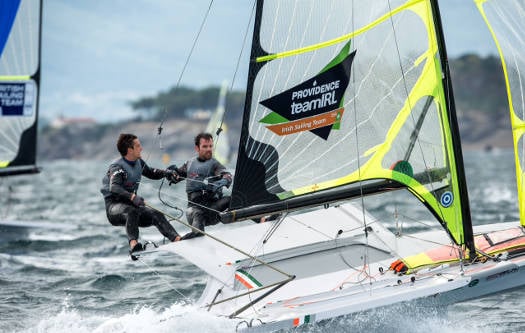 Ryan Seaton & Matt McGovern in the 49er recorded two race wins in the Rio Olympics
Ryan Seaton & Matt McGovern in the 49er recorded two race wins in the Rio Olympics
As for Andrea Brewster and Saskia Tidey in the 49er FX, they had one of their best regattas, very much at the races for most of the time, while the very young Finn Lynch – youngest sailor racing the Olympics – may not have been on his best form in the Laser Men’s, but his snatching of the Irish place in this class as late as May 18th in Mexico was testament to his grit, as he still hadn’t fully recovered from an injury sustained in an accident while out on some training cycling.
In fact, if there’s one little lesson which really came home from Rio, it’s the need to keep your athletes in one piece all year round. Our young international-level sailors can be an exuberant bunch, sometimes training and post-event relaxation becomes horseplay, and it was notable that some significant longterm campaigns were knocked off course by silly injuries.
Thus in looking back at the way Annalise’s success was celebrated in the heart-warming welcome home party at the national Yacht Club on Thursday August 26th, a notable recollection is that in thanking all those who had helped her to the Medal, Annalise particularly mentioned the physiotherapist Mark McCabe. For it seems that whatever training and guidance Mark McCabe has been giving her over the years, she has never been hampered by any serious injury or temporary disability.
This may seem a slightly odd point to be making in an annual sailing review, but there’s a lesson for sailors at every level in this. So if 2016 also emerges as the year in which we all learned the benefits of keeping ourselves in good shape and following best practice in sailing fitness, then it will have been be a very good year indeed.
But as the Olympics didn’t take over the stage until the second week in August, an impressive amount of sailing had already been registered. Indeed, it went right back to January when Doug Elmes and Colin O’Sullivan – who sail from Howth but Doug’s from Kilkenny and Colin is from Malahide – returned from Malaysia with the Bronze Medal from the 420 Worlds.
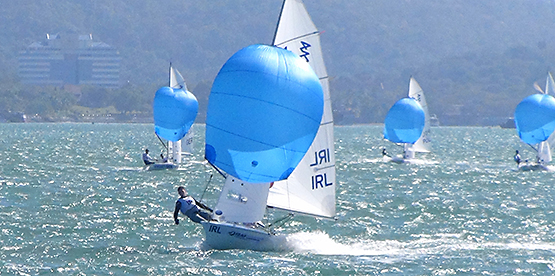 A Bronze Medal for Ireland with Doug Elmes and Colin O’Sullivan in the 420 Worlds in Malaysia
A Bronze Medal for Ireland with Doug Elmes and Colin O’Sullivan in the 420 Worlds in Malaysia
Then in February offshore racing came centre stage with the RORC Caribbean 600 seeing Conor Fogerty of Howth with his Sunfast 3600 Bam! continuing a remarkable programme of Transoceanic criss-crossing (some of it single-handed), the Caribbean 600 “diversion” producing a win in Class 3.
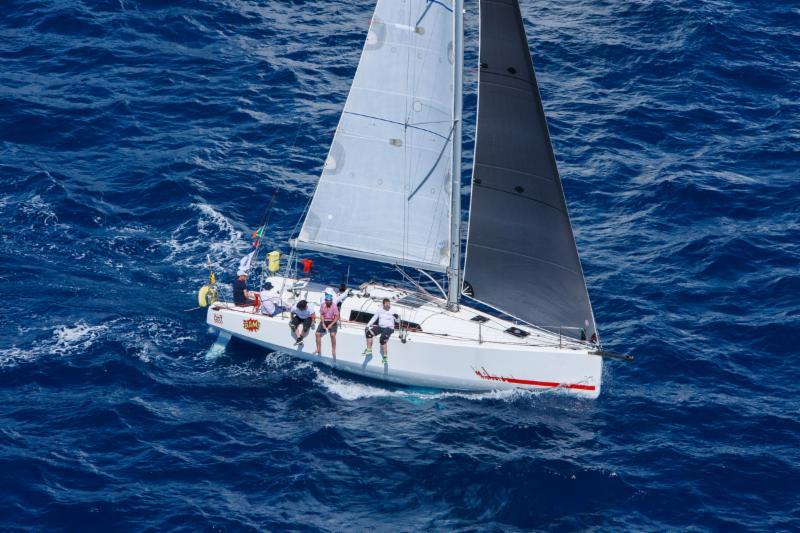 Conor Fogerty’s Bam! on the way to the class win in the RORC Caribbean 600 Race
Conor Fogerty’s Bam! on the way to the class win in the RORC Caribbean 600 Race
Into April, and attention focused on the Irish GP 14 Association’s superb group effort in getting 22 boats to Barbados for the GP14 Worlds 2016. Merely to achieve that was quite something in itself, but then Shane McCarthy of Greystones, crewed by Andy Davis, emerged as the new World Champion. That provided extra impetus back home as the rapidly developing Greystones Sailing Club worked towards its new clubhouse, which came on stream in May with the hosting of the Cruising Association of Ireland’s Start-of-Season rally.
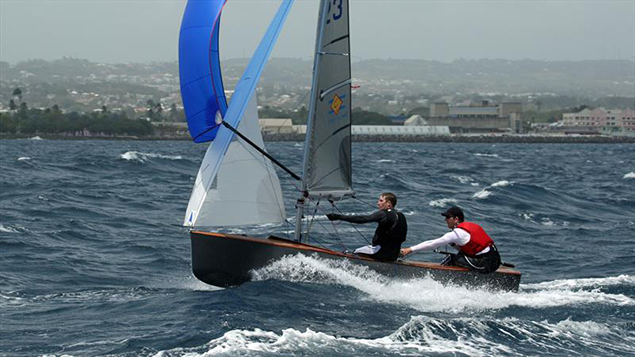 Shane McCarthy of Greystones wins the GP14Worlds in Barbados
Shane McCarthy of Greystones wins the GP14Worlds in Barbados
With the proper season in Ireland under way, June’s highlight was clearly the Volvo Round Ireland race from Wicklow, but before that ICRA had to get in their three-day Nationals at Howth, and despite light winds the programme was completed, winners including John Maybury’s J/109 Joker II in Division 1, Dave Cullen’s Half Tonner Checkmate XV in Div. 2, Ken Lawless and Siobhan McCormack’s Quarter Tonner Cartoon in Division 3, and Colm Bermingham’s Elan 333 Bite the Bullet in Division 4.
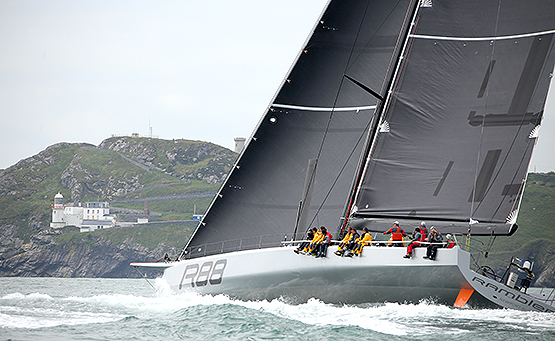 With a hugely talented crew, George David’s Rambler 88 dominated the mono hull classes in the Volvo Round Ireland race
With a hugely talented crew, George David’s Rambler 88 dominated the mono hull classes in the Volvo Round Ireland race
In the Volvo Round Ireland Race starting June 18th, for the leaders at any rate lack of wind was definitely not a problem. For those biggies, it was a cracker. And as an event, the Round Ireland is back and then some, with 63 entries including George David’s wonderful Rambler 88 and three MODs which sailed the entire course within close sight of each other, and records tumbling at every turn.
Rambler had a brilliant a crew of international talents, and they were able to take every last advantage of the fact that the weather Gods – or more properly the wind Gods – smiled on them. They took monohull line honours in a runaway record time, and then achieved what many would have thought almost impossible for a boat with a stratospheric rating - they won overall on IRC as well.
As for the MOD 70s, with Damian Foxall with Sidney Gavignet on record holder Oman Sailing, and Justin Slattery with Lloyd Thornburg on Phaedo III, there was added home interest, particularly as both Irish stars admitted they’d been so busy all over the world building their sailing careers that they were Round Ireland virgins……
And what a race the trio of trimarans served up for those virgins…... Within reach of the finish in the dark, Team Concise was in the lead in a fading breeze, but Oman Sailing went a little bit offshore and found a fresher air to come in on port tack at first light and nip into the win.
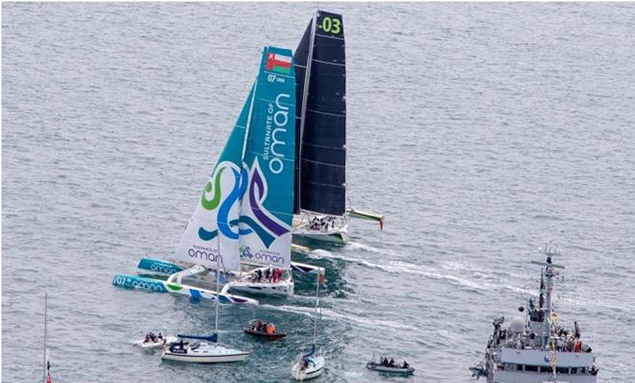 Oman Sailing and Phaedo 3 at the start of the Volvo Round Ireland Race. Oman snatched the multi-hull lead in the final mile of the race to win and overturn the record she already held.
Oman Sailing and Phaedo 3 at the start of the Volvo Round Ireland Race. Oman snatched the multi-hull lead in the final mile of the race to win and overturn the record she already held.
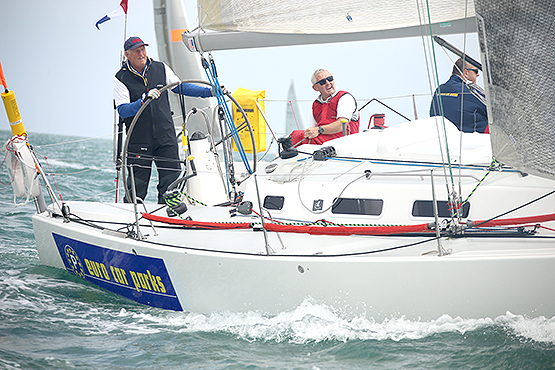 The J/109 Euro Car parks (Dave Cullen), seen here with Mark Mansfield on the helm shortly after the start, was the only Irish boat to take a class win in the Volvo Round Ireland race
The J/109 Euro Car parks (Dave Cullen), seen here with Mark Mansfield on the helm shortly after the start, was the only Irish boat to take a class win in the Volvo Round Ireland race
As for any all-Irish contenders, the best performance was put in by the J/109 Euro Car Parks (Dave Cullen), the only Irish class winner, a good marker early in the season, for at the beginning of October the temporary Euro Car parks, long since reverted to her proper name of Storm, won the Irish J/109 Nationals for Pat Kelly and his keen crew from Rush Sailing Club.
July had three major highlights – Volvo Cork Week at Crosshaven, the Topper Worlds at Ballyholme, and the KBC Laser Radial Worlds at Dun Laoghaire. While the numbers involved in the two dinghy events were stupendous, it was Volvo Cork Week which captured public imagination in an unexpected way with the inaugural Beaufort Cup series.
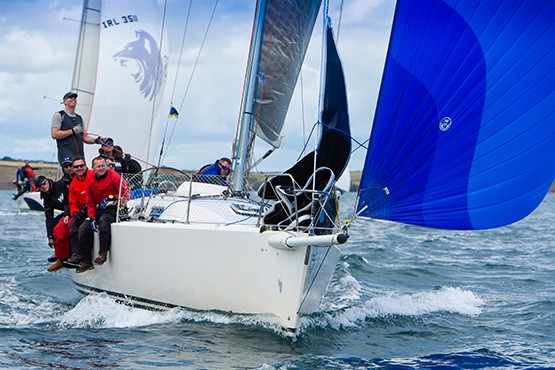 Joker II, skippered by Commandant Barry Byrne, became the first winner of the Beaufort Cup.
Joker II, skippered by Commandant Barry Byrne, became the first winner of the Beaufort Cup.
Racing for the trophy named after the famous Irish admiral and maritime researcher, the Beaufort Cup started out to be an event with an international flavour between crews from national defence forces. But then its remit was broadened to include personnel from emergency and security services with maritime links, and in the end 32 owners generously made their boat available for something which perfectly captured the mood of the moment. The amount of goodwill generated was beyond measure, and the win by an Irish Defence Forces crew skippered by Commandant Barry Byrne sailing John Maybury’s J/109 Joker II has given a visionary event an excellent inauguration.
The Topper Worlds at Ballyholme looked like providing an Irish win until the last day, when a fresh northerly swept in with real Belfast Lough vigour to make it a big boys’ game, but young Michael Carroll from Cork hung in gamely and finished fourth overall, while Sophie Crosbie from Crosshaven was first girl and 7th overall.
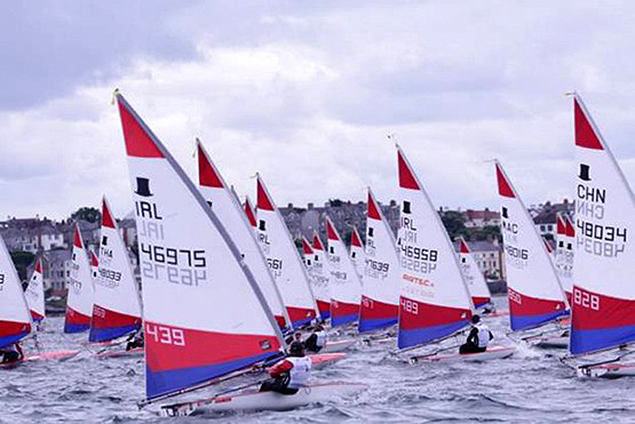 The Topper Worlds at Ballyholme had one of its most international fleets yet, including a large Irish contingent and a group from China.
The Topper Worlds at Ballyholme had one of its most international fleets yet, including a large Irish contingent and a group from China.
With a total fleet pushing towards the 350 mark, the KBC Laser Radial Worlds in Dun Laoghaire were almost beyond comprehension, but a pattern was discernible, and what was most encouraging was that at least five young Irish sailors were serious contenders at the very top level.
However, one was head and shoulders above the rest in every way, and this was Ewan MacMahon of Howth. He was right in there pitching for the Gold in some ferocious racing, and though he concluded the series with the Silver Medal, this was serious stuff and the world quite rightly sat up and took notice of a remarkable and developing talent.
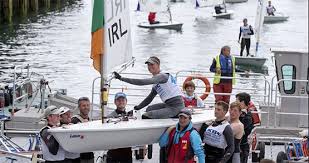 Ewan MacMahon borne ashore after winning the Silver Medal in the KBC Laser Radial Worlds in Dun Laoghaire.
Ewan MacMahon borne ashore after winning the Silver Medal in the KBC Laser Radial Worlds in Dun Laoghaire.
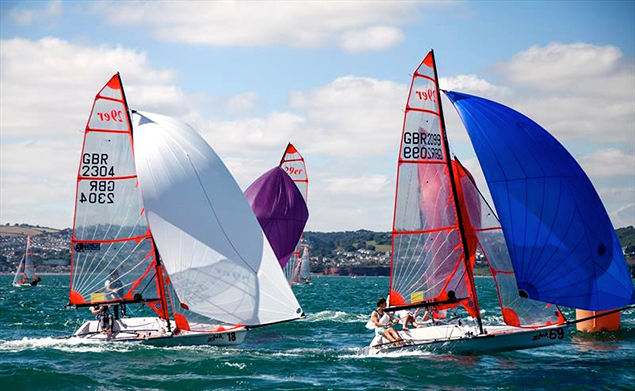 The fleet of 76 boats in the 29er British Championship at Torbay saw the win going to Harry Durcan and Harry Whittaker of Cork.
The fleet of 76 boats in the 29er British Championship at Torbay saw the win going to Harry Durcan and Harry Whittaker of Cork.
Came August, and just two days before the Olympics took all attention, 29ers took to the seas off Torbay in Devon for the annual British Championship, 76 boats in all and just one of them Irish – Harry Durcan and Harry Whittaker of Royal Cork. They won overall by two good clear points, an achievement so brilliant that further comment is superfluous.
Then in August we had of course all sorts of local festivals such as Calves Week out of Schull, but everyone’s thoughts were on the Olympics, with normality only returning after an afternoon and night of celebration seemed to have just about the entire Irish sailing community – and many non-sailors too - gathered in Dun Laoghaire and around the National Yacht Club to welcome home Annalise and her medal.
Cruising being something undertaken at its own pace, reviews of what has been achieved are a matter for more leisurely contemplation in the depths of winter. But in late August a real text-book cruise drew to its close when Neil Hegarty of Cork sailed his Dufour 34 Shelduck into Baltimore after an efficient Atlantic crossing from Newfoundland, with Shelduck blithely coping with two mid-Atlantic gales, one of Force 8 and the other hitting Force 9. There have of course been many other Atlantic crossings during 2016 involving Irish boats, but this successful conclusion of a detailed Atlantic circuit cruise of several years duration really was a model of its kind, a cruise to be savoured.
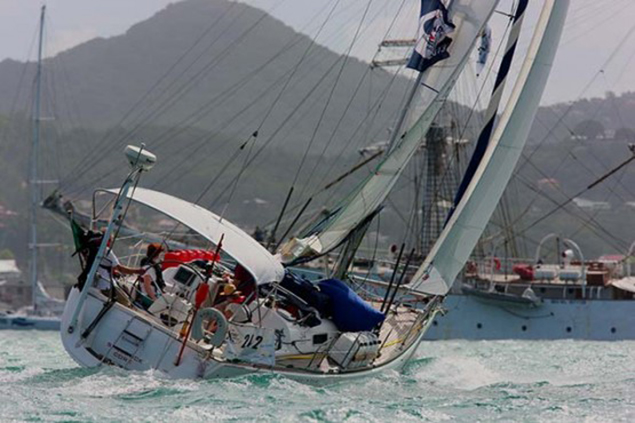 Neil Hegarty’s Dufour 34 Shelduck during her Atlantic Circuit cruise
Neil Hegarty’s Dufour 34 Shelduck during her Atlantic Circuit cruise
Other cruises and new additions to the fleet were to be savoured as the Cruising Association of Ireland held its end-of-season rally in Dublin’s River Liffey in mid-September, with a goodly fleet providing the annual entertainment of all the opening bridges being opened at the same time in a neatly choreographed exercise, which succeeded brilliantly in bringing a sense of the sea into the heart of the city.
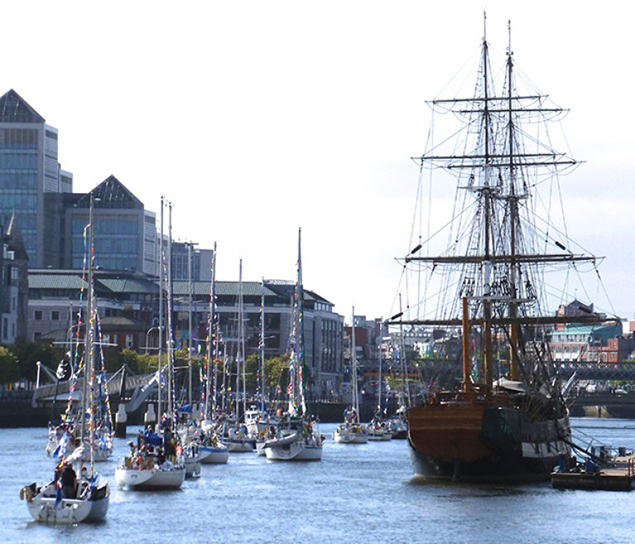 “A sense of the sea into the heart of the city” – the Cruising Association of Ireland hold their Three Bridges Rally in Dublin’s River Liffey.
“A sense of the sea into the heart of the city” – the Cruising Association of Ireland hold their Three Bridges Rally in Dublin’s River Liffey.
Meanwhile in nearby Clontarf the 70th Anniversary of the iconic Irish Dinghy Racing Association 14ft OD Dinghy was celebrated in style with a series of well-attended events driven on by the energy and enthusiasm of Ian Sargent, who saw his efforts well rewarded with a memorable Gala Dinner for the class in Dun Laoghaire at the Royal St George Yacht Club, where the concept of the IDRA 14 was first aired way back in 1946.
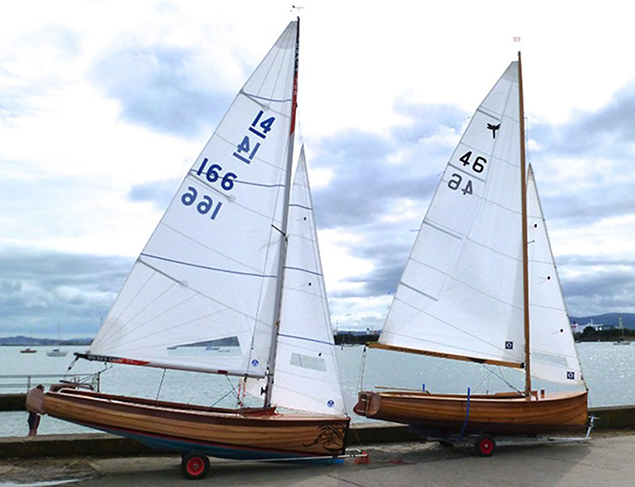 Living history. The newest IDRA 14 no. 166 (left) built 2016, and the newest Dragonfly sister-ship from Waldringfield in England, also built 2016, were the stars of the show at the IDRA 14th 70th Anniversary Regatta at Clontarf
Living history. The newest IDRA 14 no. 166 (left) built 2016, and the newest Dragonfly sister-ship from Waldringfield in England, also built 2016, were the stars of the show at the IDRA 14th 70th Anniversary Regatta at Clontarf
As for those who like it offshore with a bit of competition, 2016 was a year of further growth for the Irish Sea Offshore Racing Association, with the season neatly rounded out by a points championship settled in the final race, the overall win going to Stephen Tudor’s J/109 Sgrech from Pwllhei.
The further we got into the Autumn, the better the weather became. So although the All-Ireland Junior Championship at Schull at the end of September raced in the Dave Harte-developed TR 3.6 dinghies was put through successfully despite some very mixed weather in the rest of the country, with Johnny Durcan of Royal Cork the new champion, a week later in the first weekend of October the All-Ireland Seniors were sailed at Crosshaven with racing in the new Phil Morrison-designed Ultra variant of the National 18, and they had weather that was almost too summery on the second day.
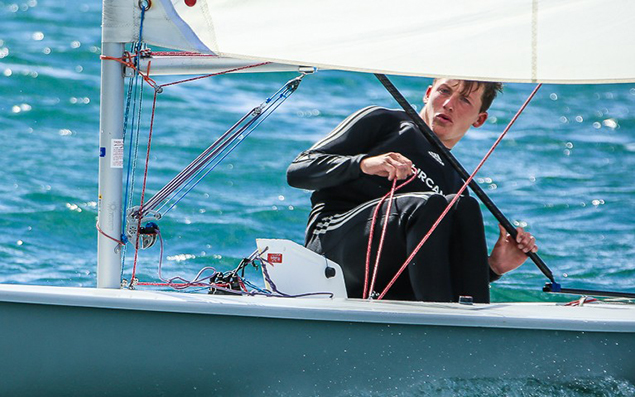 Johnny Durcan (Royal Cork) became the new All-Ireland Junior Champion at Schull at the end of September.
Johnny Durcan (Royal Cork) became the new All-Ireland Junior Champion at Schull at the end of September.
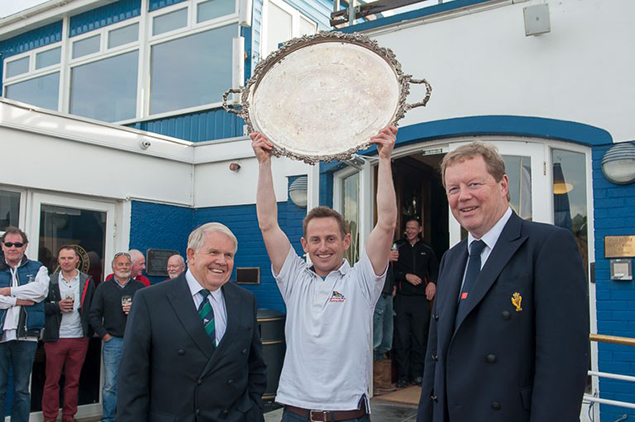 The historic salver – 2016 All-Ireland Champion Alex Barry with ISA President David Lovegrove (left) and Royal Cork YC Admiral John Roche. The annual championship for the salver will be celebrating its 70th anniversary next year.
The historic salver – 2016 All-Ireland Champion Alex Barry with ISA President David Lovegrove (left) and Royal Cork YC Admiral John Roche. The annual championship for the salver will be celebrating its 70th anniversary next year.
But a breeze filled in and it ended up as an absolute cliffhanger, with so many boats tied on points at the end that they’d to go through several permutations of countback to get a result, with RS 400 champion Alex Barry of Royal Cork and Monkstown Bay the Champion of Champions 2016.
October saw Irish interest swing towards the Mediterranean and the annual Rolex Middle Sea Race from Malta with extra Irish interest in three boats in the 107-strong fleet. Conor Fogerty’s ubiquitous Bam! appeared yet again, and though it wasn’t her most successful race, the points accumulated shunted her up to 3rd overall in the RORC Class 3 Points Championship 2016 despite doing only five RORC races, but the Caribbean 600, the Volvo Round Ireland, and the Rolex Middle Sea race all carry extra points weighting.
A better Middle Sea result was obtained by the XP 44 Xp-Act, which came second in Class 4 with her crew including the RIYC’s Barry Hurley and the Irish National Sailing School’s Kenneth Rumball. But our outstanding result was the clear overall win taken by Vincenzo Onorato’s Cookson 50 Mascalzone Latino, navigated with pure genius by international star Ian Moore, who hails from Carrickfergus.
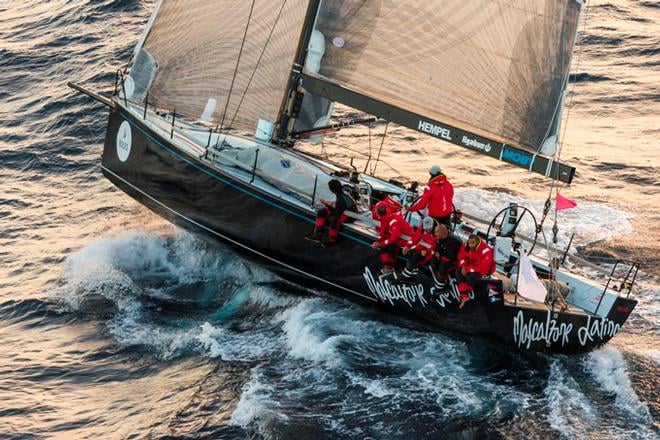 Yet another major win for Ian Moore – and yet another major win for a Cookson 50. Mascalzone Latino on her way to overall victory in the Rolex Middle Sea Race 2016. Photo Rolex
Yet another major win for Ian Moore – and yet another major win for a Cookson 50. Mascalzone Latino on her way to overall victory in the Rolex Middle Sea Race 2016. Photo Rolex
This rounded out a remarkable year for the Moore family, as his mother Wendy was Commodore 2016 in Carrickfergus Sailing Clyb, where they were celebrating their 150th Anniversary (as was the Royal Ulster YC across Belfast Lough in Bangor) with events at Carrickfergus including a Hilditch Regatta for boats constructed by the legendary Carrickfergus boatbuilder. He created many vessels of distinction including the 1898 Howth 17s, who in turn arrived in Carrick to help celebrate a year which was to finish in such style in Malta.
Except it hasn’t quite finished yet. Even as we write this. Cork Institute of Technology are in the top three in the 36th Student Yachting World Cup which concludes today in Las Rochelle. And then tomorrow the irrepressible Enda O’Coineen with Kilcullen Voyager will be one of 29 starters along the French Biscay coast off Les Sables d’Olonne, where the Vendee Globe gets under way before a crowd of tens of thousands. Irish sailing in 2016 is truly a complex and endless tapestry………
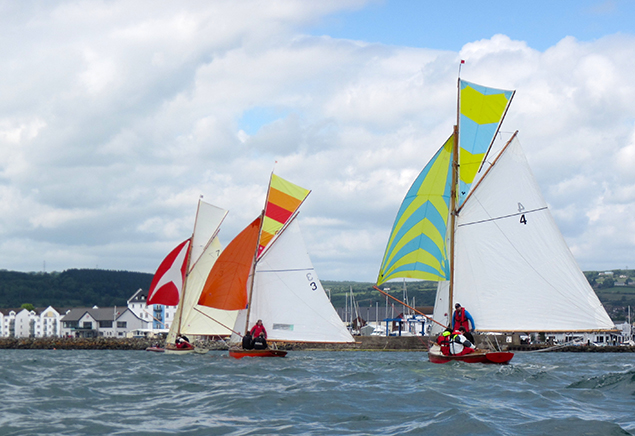
How the Defence Forces Won the Beaufort Cup
Commandant Barry Byrne tells his story of how the Irish military assembled a winning crew in a matter of months for the inaugural international inter-service sailing contest
On 15 January I was called to a special meeting in the Carrigaline Court Hotel. Our then Minister for Defence, Simon Coveney; Defence Forces Chief of Staff, Vice Admiral Mark Mellett; and key personnel from the Royal Cork Yacht Club and Kinsale Yacht Club – headed by Kieran O’Connell, chair of Volvo Cork Week 2016 – had assembled to plan a new event to be called the Beaufort Cup, named in honour of Sir Francis Beaufort, creator of the Beaufort wind force scale.
I would learn at that meeting of the goal to assemble 10 yachts, with military or emergency service crews, to compete in this new multi-race event for Cork Week. However, many present felt that given the relatively short notice – only six months – we would be doing well enough to recruit three boats to constitute a class.
One of the first teams to commit to the event were the Royal Engineers, and I will be forever grateful to them for their support at such a formative stage of the cup’s development. They gave momentum to our cause, as by the time of the event we had 12 top-class teams competing for the newly commissioned Waterford Crystal Beaufort Cup.
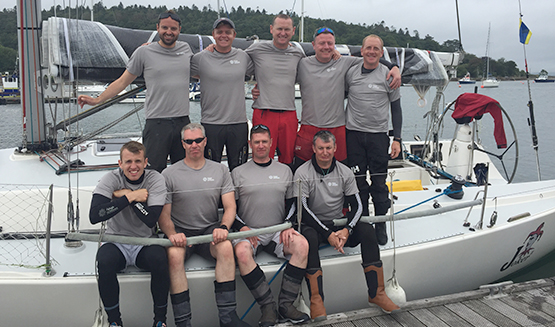
Training challenge
Assembling and training our own Defence Forces team from scratch? That was our first challenge. Many were beginners, plus we had to source the necessary boats. Through the generosity of John Maybury (Joker 2), Tom Roche (Meridian) and Dan Buckley (Justus), we secured three boats to compete in. The Defence Forces contingent increased to four when we were joined by Another Adventure, an A35 skippered for the event by Stefan Hyde. Joker 2, the national champion J109, would be our main effort at winning the cup, and I must thank our fantastic bowman, Flight Sgt Adrian Mulligan, for helping to secure the use of that vessel.
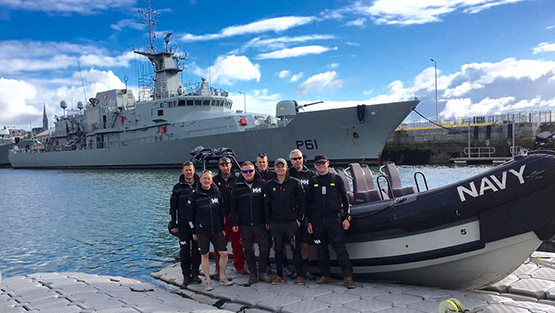
Next came the team trials to select our four competition crews. That meant training in fitness, sailing, sea survival and medical training to ensure all boats and their crews complied with the same Cat 3 regulations as the annual Fastnet Race.
We schooled the beginners on our team in sail and race training with the help of the Irish National Sailing & Powerboat School (INSS), while the Joker crew were put through their paces in manoeuvres with the help of professional coach Maurice ‘Prof’ O’Connell. Simon Johnson kindly assisted in training up our pit and bow team, and my brother Bryan Byrne also came along to share some knowledge.
As the event grew closer, I was to learn that both national and international champions were competing in our class. It was dawning on me that our newly assembled team were going to the home of yacht racing in Ireland, and the oldest yacht club in the world, to try and win a major trophy and €10,000 prize money for a charity of one’s choosing, and the competition would be fierce.
Military principles
We got Joker 2 to Cork early and, her competition pedigree notwithstanding, we spent three full days going through every single element of the boat, stem to stern, keel to windex. We replaced ropes, end-to-ended halyards, scrubbed, dehumidified, welded – you name it, we did it. If I’d quoted ‘Mr America’s Cup’ Dennis Conner’s book No Excuse to Lose to my crew one more time, I think they would have killed me.
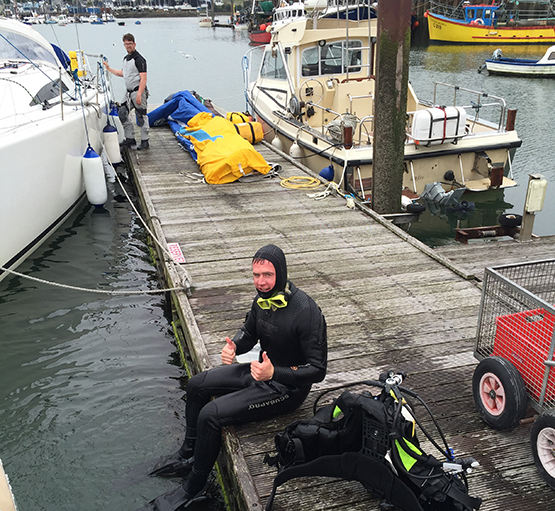
During this time, we also had a hugely important rig settings technical session with Mark Mansfield. This was to prove invaluable for the event. I wanted no ambiguity about what setting we were on for what wind condition, and I would work closely with my sole designated rig adjustor on this. Military principles in practice: one man, one job, own your job. We brought some other military principles to our sailing, too, as we had well-rehearsed standard operating procedures and clear communications, and it stood to us throughout the week.
Fastnet racing
On the morning of the start, Monday 11 July, the popping of SCUBA bubbles hitting the hull from our hardworking crew member Lt Wietse Buwalda as he scrubbed the outside provided the soundtrack as I observed our navigator reviewing the laminated, underlined and highlighted sailing instructions, and I felt like we had done everything we could to prepare for the first day – the daunting 24-hour race around Fastnet Rock.
I have been offshore racing for 20 years and I can honestly say that the short Fastnet run of the Beaufort Cup is one of the most enjoyable I have ever raced. It is the perfect length, and the race down to the famous rock is both stunningly scenic and hugely tactical, with tidal and wind influences to test the very best – not to mention the abundance of wildlife along the way, with whales and dolphins regularly spotted at this time of year. I think the race has the potential to be one of the great lures of Cork Week for international teams in future years.
After ten hours of racing, eight boats in our fleet rounded Fastnet Rock at twilight right beside one another. It was spectacular – or as Prof would say, ‘tremendous’.
Winning that race possibly came down to a single decision by our navigator, Comdt Ian Travers, to gybe out of Glandore Bay when becalmed. We gybed to get better pressure as we had no other options. That said, I do believe two factors came into play here. One, our crew had a hot meal of high-energy army ration packs inside us at one in the morning when we made that manoeuvre, so I feel we were firing on all cylinders as a crew; gybes were good, and kite peels at night went seamlessly. And two, our navigator had run seven weather routing predictions, all but one of which told him to go offshore on the way back from the rock, so he knew what he was doing, even if I didn’t.
We were awarded the impressive Sans Souci Cup at that evening’s black tie gala dinner overlooking the sea from the Naval Service base on Haulbowline. But honourable mention must go to the Royal Engineers, who were unlucky to be becalmed and, in the true spirt of military grit and determination, hung in there to finish the offshore race seven hours behind us, within two minutes of the deadline – and then, with no rest, donned their mess dress uniforms to be the life and soul of the party that night.
The Fastnet race was only the beginning of the Beaufort Cup, of course. The next day saw tighter inshore racing, but we had good starts and produced two firsts and a second, with a solid performance from everyone on the team.
Thursday was the harbour race – and as luck would have it, we dropped our course card over the side six minutes before the start. In the commotion, we ended up dead last on the start. But I have to say, what followed was one of the most tense but also most enjoyable races of my life, as our navigator Capt Mick Liddy – who had replaced Comdt Travers after the offshore – and tactician Peter Bayly picked clear lanes through the fleet and had us in the right air the entire way as we sailed from almost last to first and beat every other J109 in the fleet.
Trust your team
That harbour race, which was to become the last of the event due to fog on the final day, confirmed everything I have always believed about yacht racing: put a team around you that you trust, and then trust them. Let them do their job. I had one policy for that light-winds race, and really it was a policy for the event in general: watch the tell-tales, keep the boat moving fast, and turn the wheel as little as possible. I trusted the team to do everything else.
At the final prizegiving I announced that we would be donating the majority of our winnings to Our Lady’s Children’s Hospital, Crumlin – but in addition, as a mark of respect to the fantastic competition put up by the RNLI crew led by Nicholas O’Leary on True Penance, we would also donate €1,000 to the RNLI. That team performed mightily, with only seconds between us in most races.
Commenting on our victory, Commodore of the Defence Forces Sailing Club, Colonel Peter Richardson, said: “Judging by the success of this inaugural effort, I believe the Beaufort Cup can and will grow to be the top services regatta in the world, attracting hundreds of international competitors, strengthening international and national bonds, and showcasing the fantastic sailing grounds that Cork has to offer.
"Every military in the world recognises the benefits of offshore sailing for leadership and teambuilding; there are no places to hide on a boat in bad weather. As an island nation, we must embrace this resource. Congratulations to the Joker 2 crew on their wonderful achievement.”
I would like to thank the entire Defence Forces team for their efforts in our Beaufort Cup challenge. Thanks also to Kieran O’Connell and the Volvo Cork Week race office for a great event; and our sponsors Axiom Private Clients, Spanish Point Technologies, Helly Hansen and CH Marine. Thank you as well to everyone in the Department of Defence and Defence Forces who helped make this happen.
As I write, services teams from France, Italy, Spain and the US have already committed to challenge for the Beaufort Cup in 2018, and the Irish Defence Forces will be there to defend it.
The crew of the Joker 2 was:
Comdt Barry Byrne
Lt Marcus Ryan
Peter Bayly
Capt Michael Liddy
Brian Phelan
Armn Gary Phelan
Sgt Patrick McGrath
Lt Wietse Buwalda
Flt Sgt Adrian Mulligan
Comdt Ian Travers
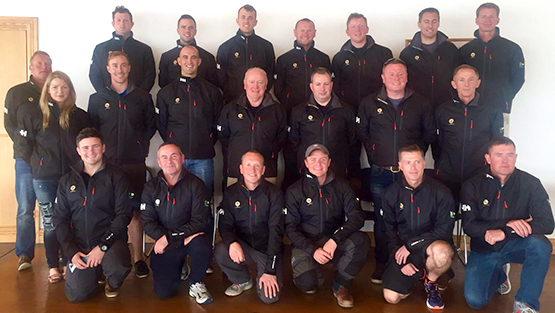 Defence forces Sailing Club: Back row: Comdt Eoin O'Sullivan, Lt Eugene Mohan, Lt Marcus Ryan, Flt Sgt Adrian Mulligan, Pte Stephen Leddy, Lt Cdr Brian Mathews, Comdt Brian Sweeney Middle Row: Cpl John Ferns, Capt Catherine Lundon, Capt Oisin Branagan, Comdt Shane Keogh, Col Peter Richardson, Comdt Mark Donnelly, Sgt Patrick McGrath, Lt Col Oisin Cahill. Front Row: Capt Tom Quigley, Sgt Dave Sliney, Armn Gary Phelan, Comdt Barry Byrne, CS John O'Rielly, Lt Wietse Buwalda.
Defence forces Sailing Club: Back row: Comdt Eoin O'Sullivan, Lt Eugene Mohan, Lt Marcus Ryan, Flt Sgt Adrian Mulligan, Pte Stephen Leddy, Lt Cdr Brian Mathews, Comdt Brian Sweeney Middle Row: Cpl John Ferns, Capt Catherine Lundon, Capt Oisin Branagan, Comdt Shane Keogh, Col Peter Richardson, Comdt Mark Donnelly, Sgt Patrick McGrath, Lt Col Oisin Cahill. Front Row: Capt Tom Quigley, Sgt Dave Sliney, Armn Gary Phelan, Comdt Barry Byrne, CS John O'Rielly, Lt Wietse Buwalda.
#CorkWeek - For the inaugural IRC European Championship at this year's Volvo Cork Week, the top three boats all came from different IRC classes and the result was incredibly close.
And after the final day's results, it turns out the antique silver IRC European Champion Trophy, presented by the Royal Ocean Racing Club, will not be going far – as Royal Cork YC's Paul Gibbons, racing Quarter Tonner Anchor Challenge, emerged the winner.
“This has been such a fantastic regatta, Volvo Cork Week is very competitive, and we had a real fight on our hands to win our class, let alone the IRC European Championship," said Gibbons from the winners' podium. "I would like to thank my crew, without a good team we would never have achieved the success. We will definitely be back to defend our win in Marseille next year.”
Shrouded in sea fog, the final day of racing at Volvo Cork Week was curtailed to just one race for some classes. However, as the mist cleared, class winners appeared and the inaugural IRC European Championship went to the wire.
Located outside Cork Harbour, the visibility was just too bad for safe racing for IRC Zero, One and Two and the results remained unchanged from the previous day.
The final prizegiving was held at the Royal Cork Yacht Club, established in 1720, and the antique silverware presented includes some of the world oldest and famous trophies.
But the two biggest awards of Volvo Cork Week are brand new this year.
John Swan's Howth team, racing Half Tonner Harmony, was second, winning the Royal Cork Perpetual Salver. Tony Ackland's Swansea YC team, racing Dubois 37 Dark Angel, was third and was awarded the prestigious prize of the Kinsale Kettle for Boat of the Week.
“This is the best Cork Week we have ever done and to be awarded Boat of the Week is a big honour. We will be toasting our friends tonight and when we get back to Swansea. Congratulations to all the winners, it has been great to be a part of this regatta,” said Ackland.
The Waterford Crystal Beaufort Cup, commissioned by former Marine Minister Simon Coveney, was won by Defence Forces B racing Joker 2, skippered by Cmdt Barry Byrne, as previously reported on Afloat.ie.
Baltimore RNLI racing True Penance, skippered by Nicholas O'Leary, was second while the PSNI racing Freya, skippered by Conor Doyle, came third.
Defence Force B Team have nominated Our Lady's Children's Hospital, Dublin for the €10,000 award. But the winning team have also donated €1,000 to Baltimore RNLI as a show of sportsmanship.
“To have so many teams and top quality racing in the first year of the Beaufort Cup is amazing,” said Cmdt Byrne. “The offshore race around the Fastnet is one of the most enjoyable races I have ever done. We saw dolphins and whales literally the whole way round and eight boats rounded the Fastnet Rock within sight of each other.
"We already have confirmed interest from USA, France, Canada and Spain for 2018. The goal is to make the Beaufort Cup the biggest emergency and military services regatta in the world and I would like to applaud Minister Simon Coveney and Vice Admiral Mark Mellett for their continued support for the initiative and all of the teams that participated.”
 Tony Langley's TP52 Gladiator leads the fleet in the Harbour Race Photo: Ingrid Abery
Tony Langley's TP52 Gladiator leads the fleet in the Harbour Race Photo: Ingrid Abery
Anthony O'Leary's Ker 40 Antix from the Royal Cork YC are the IRC Zero champions, beating strong opposition from Tony Langley's British TP52 Gladiator and Eric De Turckiem's French A13 Teasing Machine.
The class was fiercely contested with both Antix and Gladiator taking three wins a piece in the seven race series. Antix won the class by just one point.
Tony Ackland's team from Swansea YC, racing Dubois 37 Dark Angel, dominated IRC One. Jay Colville's First 40 Forty Licks from East Down YC in Northern Ireland was second in class and Royal Cork's Conor Phelan, racing Ker 37 Jump Juice was third, fending off a strong challenge from Charlie Frize's Scottish team, racing Mills 36 Prime Suspect.
The team from Clyde CC were the winners of the Hugh Coveney Trophy, for the best team under IRC in the Harbour Race.
Paul O'Higgins Royal Irish YC team, racing JPK 10.80 Rockabill VI, corrected out to win IRC Two by four points from Robert McConnell's A35 Fools Gold. A terrific battle for third place was won by Richard Goodbody's Royal Irish team, racing J/109 White Mischief. RORC Commodore Michael Boyd, racing Irish JPK 10.80 Audrey was fourth and William Wester's Dutch team, racing Grand Soleil 37 Antilope was close behind in fifth.
In IRC Three, John Swan's Howth YC team, racing Half Tonner Harmony, was the runaway winner, scoring five bullets at Volvo Cork Week. Patrick Farcy's French JPK 9.60 Cavok won the last race of the championship to snatch second by a single point from Paul & Deirdre Tingle's Royal Cork team, racing X-34 Alpaca.
Simon Henning's Guernsey YC team, racing 1720 Alice, was the runaway winner of the Mixed Sportsboats Class. George Sisk's Farr 42 WoW won a close encounter in IRC Coastal Class 1. Nick Ogden's Ulula and Sheila & James Tyrrel's J/112e Aquelina was just a point behind the winner.
Martin Breen's Port of Galway Team won IRC Coastal Class 2, winning three of the four race series. Jimmy Nyhan's Out Rigger was the winner of the Club Regatta Fleet, with three straight bullets. Tom McNeice's Sigma 33 Minx III was the winner in the non-spinnaker class, which was only decided on the last race of the seven race series.
The non-spinnaker class is growing at Volvo Cork Week and proving extremely competitive. Of the 12 entries this year, six teams made the podium during the regatta. Kieran McCarthy's Voxpro team won the Try Sailing Challenge, the initiative has received much acclaim and interest with 120 people applying to join the initiative across Ireland.
VIPs for the final award ceremony were Adrian Yeates, managing director of Volvo Cars Ireland, Naval Service Vice Admiral Mark Mellett and Royal Ocean Racing Club Commodore Michael Boyd.
Afloat.ie’s W M Nixon won’t divulge when he first sailed into Cork Harbour, but he claims to have taken part in an early version of Cork Week as long ago as 1970. And he also claims that, at the Week of 1992, when ashore he never went beyond the RCYC’s Regatta Compound. He was overnighting aboard his boat which was a competitor, and after racing the whole sailing world and all facilities were to be found right there in the compound. There was no need to go any further. Here, he casts an eye over Volvo Cork Week 2016, and reflects on the extraordinary story of the hosting club.
There was a time when most histories of sailing were based on the idea that yachting as we know it didn’t really begin until 1815, when the final defeat of Napoleon at the Battle of Waterloo provided peaceful seas off Europe to allow recreational sailing to develop into what ultimately became many forms, involving boats and rigs of all types.
It’s a process which continues today. But while the change in circumstances in 1815 was undoubtedly a major force in accelerating the development of the sport, anyone in Cork will be only too happy to tell you that by the time of Waterloo, the Water Club of the Harbour of Cork had been in existence for all of 95 years.
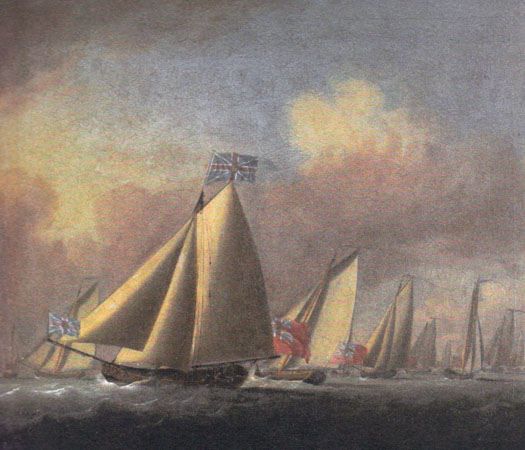 The great pioneers. The yachts of the 1720 Water Club of the Harbour of Cork, as recorded by Peter Monamy in 1738. Courtesy RCYC
The great pioneers. The yachts of the 1720 Water Club of the Harbour of Cork, as recorded by Peter Monamy in 1738. Courtesy RCYC
And up Athlone way, they’ll determinedly assert that Lough Ree YC came into being in some form or other in 1770, so it was looking at 45 years by the time of Waterloo. But on Lough Ree, you could be reasonably confident that your day’s sailing wouldn’t be spoilt with an attack by French privateers. Yet the Privateer threat was a fact of life in the seas off Cork in the turbulent times as the 1700s drew to a close, and the cheekier ones even came right into Cork Harbour itself.
Nevertheless although the 1720-founded Water Club had a tenuous-enough existence at times, as soon as peace broke out it reasserted itself, a notable instance being in 1802 after the Peace of Amiens, and again in 1806 when the Battle of Trafalgar in 1805 had greatly reduced the French threat at sea.
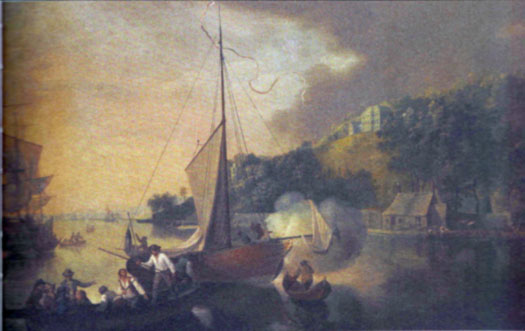 The quiet years. A lone yacht of the Water Club shown in a panting by Nathanael Grogan in the upper harbour of Cork at Tivoli in the late 18th century
The quiet years. A lone yacht of the Water Club shown in a panting by Nathanael Grogan in the upper harbour of Cork at Tivoli in the late 18th century
With each revival, names of “Old Members” would be added to the lists of new people who wished to keep the club going. And though there may have been times when Annual General Meetings weren’t held – a requirement for any club’s continuing validity today – the old Water Club always seems to have been part of the warp and weft of the great fabric of Cork Harbour, where they’d a much more relaxed attitude to the necessity for an AGM in the dim and distant past.
It became the Royal Cork Yacht Club in 1830 when sailing was being re-structured at national level, and it was always enumerated as Club No 1 in the official listings, even if the Royal Yacht Squadron tended to be listed above it. Yet if you were at the opening party of Volvo Cork Week at the Royal Cork in Crosshaven last Sunday evening, you could have been forgiven for thinking that this was a happening being organised by the newest club on the block.
The fact is the Royal Cork is not merely ageless – it is eternally young. In this era of outdoor festivals, at events like Sunday’s opening party they showed themselves ahead of the curve in having world-standard sound systems which provide a welcome and easily-audible intimacy for speakers, enabling them to put through an informative programme of crisp speeches in comfortable time as the party buzz built steadily among the gathered multitude, whose friendly attention was duly rewarded by the arrival of a sunny evening.
The atmosphere was of one great big happy family gathering. And if this seemed to be a family with many members holding high military rank with decorations to match, it’s because the occasion was taken to launch the Beaufort Cup in all its official glory, and there were more naval and other military attaches present than you’ll see at many a National Day parade.
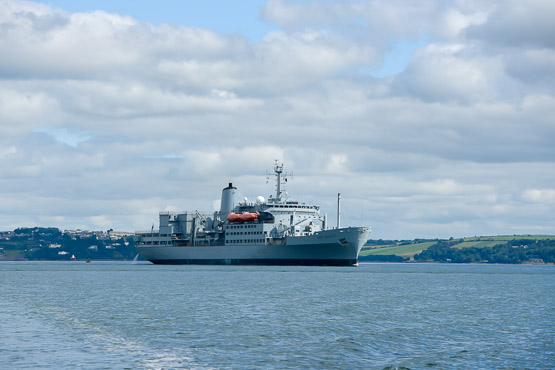 Naval presence. The successful staging of the first Beaufort Cup series within Volvo Cork Week 2016 saw increased naval activity in Cork Harbour, including this Royal Navy Supply Ship. A highlight of the Beaufort Series was a black-tie dinner for all competing crews in the Naval Base on Haulbowline Island on Tuesday night. Photo: Bob Bateman
Naval presence. The successful staging of the first Beaufort Cup series within Volvo Cork Week 2016 saw increased naval activity in Cork Harbour, including this Royal Navy Supply Ship. A highlight of the Beaufort Series was a black-tie dinner for all competing crews in the Naval Base on Haulbowline Island on Tuesday night. Photo: Bob Bateman
But far from parading military might, the Beaufort Cup is all about comradely sailing competition, providing sport afloat for people who normally look on being at sea in a very different light. And it was not just between people in the armed forces, but between agencies of all kinds – life-saving, fisheries supervision, port inspection or whatever – where I suppose the only common denominator is that at some stage the people involved might wear a uniform.
The trophy commemorates Meath-born Admiral Sir Francis Beaufort (1774-1857) whose achievements in hydrography and marine science were many. The idea of commemorating him in this way certainly captured the Volvo Cork Week imagination, with people readily making their boats available to agency crews who did not have access to craft of their own.
The spirit of it all was exemplified by the first boat and crew to the Fastnet Rock in the Beaufort’s long opening race. It was Conor Doyle of Kinsale’s X442 Freya, crewed by the Police Service of Northern Ireland. And then the overall winner of this special Fastnet race on corrected time was John Maybury of Dun Laoghaire’s champion J/109 Joker 2, sailed by an Irish Defence Forces crew skippered by Commandant Barry Byrne.
Barry Byrne and his crew on Joker 2 continued their success through the week as the varied fleet was put through a programme of equal variety, and it was singularly ironic that Class 0 in the Combined Fleets Harbour Race for the Hugh Coveney Trophy – surely the ultimate combination of a sailing come-all-ye and a festival of local knowledge – should be won by Eric de Turckheim’s A13 Teasing Machine, which is rightly recognised as one of the greatest offshore racers currently active on the planet, but arguably not a boat the smart money would have backed to win her class in a crowded race in the winding waters of Cork Harbour.
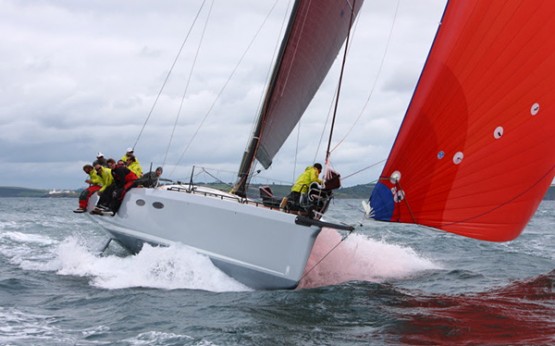 Teasing Machine revelling in a breeze at the start of the week. Yet she won Class 0 in lighter airs in the Harbour Race. Photo: Tim Wright
Teasing Machine revelling in a breeze at the start of the week. Yet she won Class 0 in lighter airs in the Harbour Race. Photo: Tim Wright
And as for the alleged benefits of local knowledge, perhaps the Cork sailors were being just too clever in using their supposed experience in the weird ways of the tides and winds within this historic natural harbour, for the overall winner of the Harbour Race was Charlie Frieze’s Mills 36 Prime Suspect from Scotland, which made a good start in clear air, and continued to build on it.
In a sense, it was a double victory, as the breeze freshening towards the end naturally favoured the smaller boats over those already finished, despite Tony Langley’s TP52 Gladiator having zapped round the course in less than two hours. But although Prime Suspect was clearly mid-fleet in size, she put in such a neat showing she stayed ahead of Quarter Tonners and the like to take the prize.
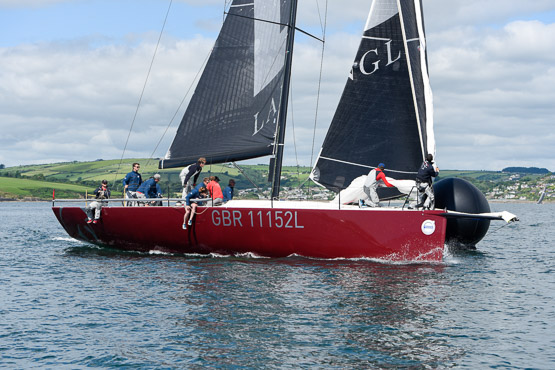 Tony Langley’s TP52 Gladiator took line honours in the Harbour Race. Photo: Bob Bateman
Tony Langley’s TP52 Gladiator took line honours in the Harbour Race. Photo: Bob Bateman
In fact, the view that smaller boats would be favoured by the freshening breeze doesn’t really stand up to examination, as second overall was taken by Richard Matthews’ new H39 Oystercatcher XXXI, a notably handsome boat in a very distinctive shade of blue. And as for assertions that an excess of local knowledge can sometimes be a drawback, Oystercatcher XXXI proved otherwise, as her crew included Eddie English who probably knows more of the sailing ways and wiles of Cork Harbour than anyone else on the planet.
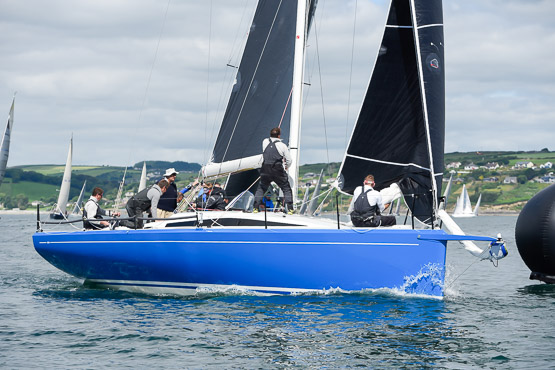 A bit of local knowledge didn’t go amiss…..with Eddie English of Cobh on board, Richard Matthews’ new Oystercatcher XXXI took second overall in the Harbour Race. Photo: Bob Bateman
A bit of local knowledge didn’t go amiss…..with Eddie English of Cobh on board, Richard Matthews’ new Oystercatcher XXXI took second overall in the Harbour Race. Photo: Bob Bateman
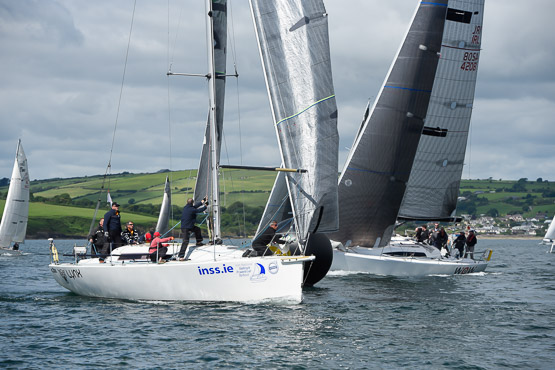 An unrivalled learning environment – the Irish National Sailing School of Dun Laoghaire’s Reflex 38 Lynx in action in Cork. Photo: Bob BatemanThird slot overall went to John Swan’s Half Tonner Harmony from Howth, continuing her dominance of Class 3 where she’d already logged six bullets in eight races by the time they took on the points-free harbour melee.
An unrivalled learning environment – the Irish National Sailing School of Dun Laoghaire’s Reflex 38 Lynx in action in Cork. Photo: Bob BatemanThird slot overall went to John Swan’s Half Tonner Harmony from Howth, continuing her dominance of Class 3 where she’d already logged six bullets in eight races by the time they took on the points-free harbour melee.
Whether sailing for fun in the Harbour Race, or competing with a real edge for points gains in races included in the European IRC Championship, there can be absolutely no doubt that this Volvo Cork Week is all about high-pitched racing, and as such is light years away from the Admiral Sailing in formation which was at the core of the sea-going activities of the Water Club in its early days.
Or is it? At mid-week I’d a very amiable discussion with Royal Cork YC archivist Dermot Burns as to whether or not the original Club of 1720 included racing in its activities. He reckons a form of competitive sailing - beyond that of showing your ability to maintain station relative to the Admiral while moving along in formation - is suggested in the Sailing Orders which were re-published in 1765 after the club had gone through one of its regenerations in 1760, though it does involve assuming that the Orders of 1765 reflected the original orders of 1720.
The many orders are un-numbered, but down around what would be number 17 we find:
“WHEN the Admiral will have the whole Fleet to Chace, he will hoist Dutch colours under his Flag, and fire a Gun from each Quarter; if a single boat, he will hoist a Pendant, and fire as many guns from the side as the Boat is distanced from him. WHEN he would have the Chace given over, he will hawl in his Flag and fire a Gun”.
Dermot’s very reasonable contention is that “Chace” is in the same sense as Steeplechasing for horses, and that these are straightforward orders for either fleet races or a match race, the start simply being made by piling on the speed from whatever position you’re in when the Admiral gives his signals.
It’s a long way from today’s precisely-laid committee boat starting lines. And it boggles the mind to think of your average modern crew trying to decide what Mr Big means when he starts firing guns from every quarter and sending all manner of flags aloft. But it’s part of the joy of studying the long history of the Royal Cork Yacht Club that such gems for interpretation come our way.
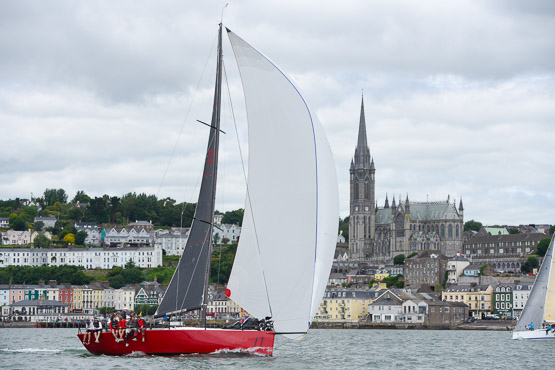 Admiral’s orders? Former RCYC Admiral Anthony O’Leary racing top contender Antix off the Cobh waterfront. Photo: Bob Bateman
Admiral’s orders? Former RCYC Admiral Anthony O’Leary racing top contender Antix off the Cobh waterfront. Photo: Bob Bateman
And who knows, but with further tangential study it may still be possible to find out who actually won those earliest races. For though we soon find notices of a up-coming races of the Water Club being advertised in the local press, accounts of what actually happened, if they appear at all, can be confused in the extreme as the reporter is often too giddy with listing the names of the great and the good who are present, and how fashionable the gathering is, to give us the hard facts of yacht race results.
Meanwhile, Dermot was also able to put me right on the notice advertising the forthcoming Water Club Race of 1787 as entitling the winner to an Anchor. Far from being a complex right to decide where the fleet should anchor, the word is that an Anchor is a substantial measure of brandy. I should have known that.
Some histories can evoke happy memories combined with entertaining and friendly debates among friends. Such is the story of the Royal Cork Yacht Club. And with the prospect of the RCYC 300th Anniversary in 2020 coming steadily down the line, the good news is that there was across-the-board political representation at a very high level at the Crosshaven events on Sunday July 10th. So much so, indeed, that it’s reasonable to expect that whatever government is in power in 2020, there’ll be proper official support for the celebration of this unique Tricentenary for an ever-young club which could only have been founded in Ireland, and only in Cork at that.
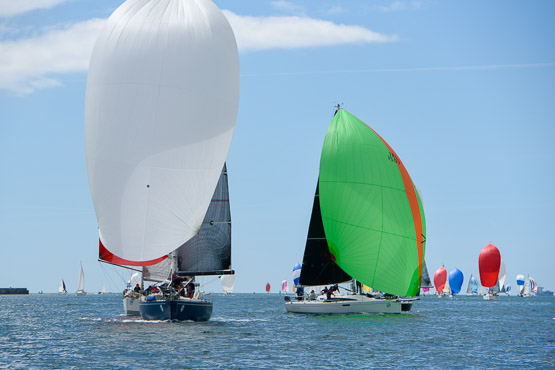 At last! The summer comes in from the sea at Volvo Cork Week 2016. Photo: Bob Bateman
At last! The summer comes in from the sea at Volvo Cork Week 2016. Photo: Bob Bateman
Cork Week Champions Waiting To be Crowned
After today's Volvo Cork Week Harbour Race, the 100–boat fleet is poised to crown its Cork Week and IRC European champions tomorrow.
One hundreds yachts, of all shapes and sizes, graced Cork Harbour on the fourth day of Cork Week. The weather lived up to the spectacular location with bright sunshine bathing the course for most of the day. Tony Langley's TP52 Gladiator romped around the course in under two hours to take line honours but after time correction Eric De Turckiem's Teasing Machine was the winner of IRC Zero. Towards the end of the race, fresh breeze favoured the smaller yachts, and the overall results after IRC correction favoured the pocket rockets.
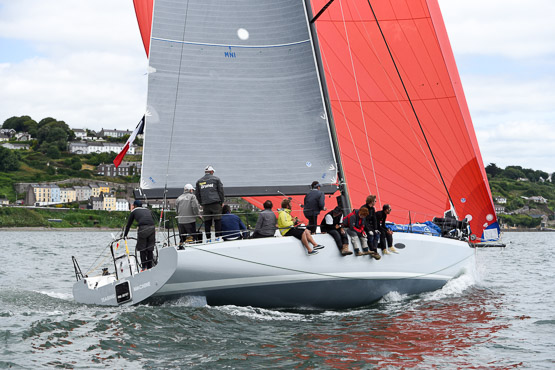 Eric De Turckiem's Teasing Machine was the winner of IRC Zero Photo: Bob Bateman
Eric De Turckiem's Teasing Machine was the winner of IRC Zero Photo: Bob Bateman
 Richard Matthews' H39 Oystercatcher XXXI. Photo: Bob Bateman
Richard Matthews' H39 Oystercatcher XXXI. Photo: Bob Bateman
Charlie Frieze Scottish team, racing Mills 36 Prime Suspect, was the overall winner, their rivals in IRC One, Richard Matthews' H39 Oystercatcher XXXI was second overall and John Swan's Half Tonner Harmony from the Howth YC was third.
“We got a good start which was crucial in such a big fleet, clear air on the short beat and room at the top mark was the early goal.” commented Charlie Frieze. “Once we were inside the harbour we were able to run a symmetrical spinnaker in the light air, whilst others had to sail greater distances to keep their asymmetric spinnakers filled. In the later part of the race the breeze built, which helped us punch through the negative tide.”
Prime Suspect will be awarded the coveted Hugh Coveney Trophy on Friday at the Final Prize Giving. Richard Matthews' Oystercatcher XXXI was second overall and John Swan's Harmony was third.
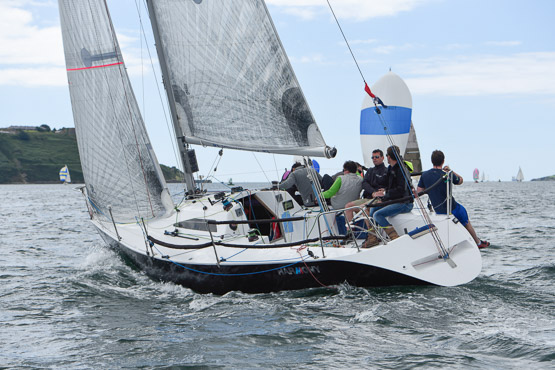 In IRC Three, John Swan's Half Tonner Harmony was the winner. Photo: Bob Bateman
In IRC Three, John Swan's Half Tonner Harmony was the winner. Photo: Bob Bateman
Robert McConnell's A35 Fools Gold took line honours in IRC Two, one minute ahead of Richard Goodbody's J/109 White Mischief after time correction. Pat Kelly's J/109 Rush was third by just ten seconds.
In IRC Three, John Swan's Half Tonner Harmony was the winner. The team from Howth are now firm favourites to win IRC Three having won six out of eight races. For the Harbour Race, Paul & Deirdre Tingle's Alpaca was second and Patrick Farcy's Cavok was third.
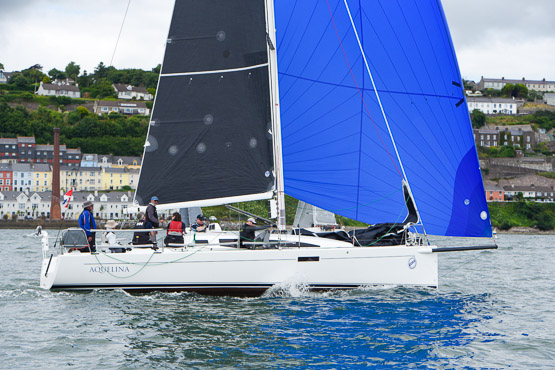 In IRC Coastal One, Sheila & James Tyrrell's Aquelina from Arklow was second by just seven seconds Photo: Bob Bateman
In IRC Coastal One, Sheila & James Tyrrell's Aquelina from Arklow was second by just seven seconds Photo: Bob Bateman
In IRC Four, Paul Gibbons' Royal Cork team, racing Quarter Tonner Anchor Challenge posted their sixth win of the regatta by a comfortable margin from the Under 25 Howth team, racing J/24 Ireland's Eye Kilcullen. Andrew & Cheissie Laming's team from the St. Mawes Sailing Club in Cornwall was third.
 George Sisk's Farr 42 Wow was third in the Harbour race Photo: Bob Bateman
George Sisk's Farr 42 Wow was third in the Harbour race Photo: Bob Bateman
The winner of The Harbour Race for Coastal Fleet One was Nick Ogden's Ulula. Sheila & James Tyrrell's Aquelina was second by just seven seconds. George Sisk's Farr 42 Wow was third for the Harbour race but retains the class lead. Martin Breen's Dehler 37 Port of Galway is dominating the Coastal Fleet 2 Class, scoring their third win today.
The inaugural ISA Try Sailing Invitational is part of Volvo Cork Week. The initiative aims at introducing as many people as possible to the joys of sailing. Racing in 1720 sports boats, the teams enjoyed the atmosphere and adrenalin rush of The Harbour Race.
“To think that a few months ago, none of these people had ever sailed a boat before, they have come a long way.” commented Voxpro's Donal Hegarty, winner of the Harbour Race. “Sailing is a great way to get people together and our company is also using the initaitive to raise money for charity. The new sailors showed how far they had come today, the chat was about tide and shifts and for them to come and race at one of the world's best know regattas, had them star gazing.”
Racing at Volvo Cork Week, incorporating the IRC European Championship, concludes tomorrow with up to three races scheduled. Tomorrow night the first IRC European Champion will be crowned.
Cork Week Harbour Race Photo Gallery
Cork Week reporter Louay Habib
Cork Week 2016 Harbour Race – Photo Gallery
Volvo Cork Week's Harbour Race highlight for the combined 100–boat fleet took place today.
Bob Bateman captured the action for Afloat.ie in the gallery below:
There were separate IRC and ECHO handicap divisions
Royal Cork Yachts Lead In Two IRC Divisions At Cork Week
Royal Cork Yacht Club entries lead class zero and four after seven races sailed at Cork Week 2016 but other IRC fleets are being led by yachts from other sailing centres drawn from across the Irish Sea at Dun Laoghaire, Howth and Swansea.
Seven of the ten races scheduled for the inaugural IRC European Championship have now been completed. Yachts equally matched by the IRC Handicap system, competitors have enjoyed a variety of courses, testing the all round ability of crew and their yachts. On Day Three, all of the IRC Classes were racing in the Atlantic Approaches on either the Windward Leeward or Slalom Course. The key to a top performance today was reacting to the squalls and shifts.
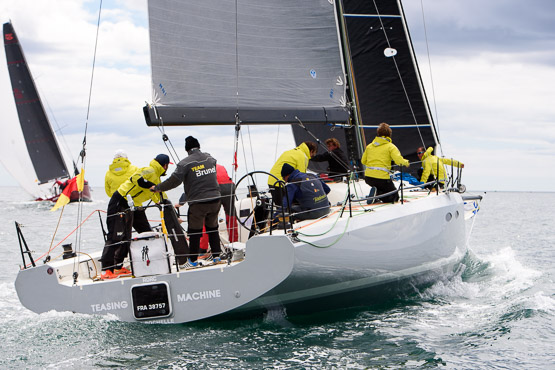 Eric De Turckiem's A13 Teasing Machine from La Rochelle is competing in Class 0. Photo: Bob Bateman
Eric De Turckiem's A13 Teasing Machine from La Rochelle is competing in Class 0. Photo: Bob Bateman
IRC ZERO
Royal Cork's Anthony O'Leary, racing Ker 40 Antix, leads the class by virtue of two wins today but it was far from easy. Race 5 was won by 14 seconds and Race 7 by 30 seconds on IRC corrected time. Eric De Turckiem's Teasing Machine, more akin to offshore sailing, struggled on the windward leeward course dropping to third. Tony Langley's TP52 Gladiator is now second in class.
“It's a small but very selective field” commented Anthony O'Leary, “Our competition races in some of the world's top races and has been very successful. So to be leading today is very satisfying. Tomorrow's Harbour Race is not part of the IRC European Championship but there are very prestigious trophies up for grabs and we will be racing just as hard to win. Friday we will find out who has won the class, and it would be a very special win if we can achieve it.”
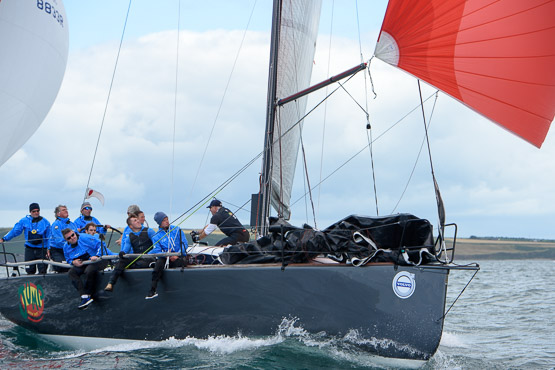 Conor Phelan's Jump Juice from Royal Cork is third overall after seven races in IRC one. Photo: Bob Bateman
Conor Phelan's Jump Juice from Royal Cork is third overall after seven races in IRC one. Photo: Bob Bateman
IRC ONE
Tony Ackland's Swansea YC team, racing Dubois 37 Dark Angel, leads a highly competitive class having won three out of seven races. Jay Colville's East Down YC team, racing First 40 Forty Licks, is second by just half a point from Charlie Frize's Scottish team, racing Mills 36 Prime Suspect. Seconds count in this highly competitive class, epitomised by a dead heat for second between Prime Suspect and Forty Licks in Race 5. Royal Cork's Conor Phelan, racing Ker 37 Jump Juice, is just half a point off the podium.
“It's going well and that is down to great team work and some excellent local knowledge from Robert O'Leary. We are out racing most of the time in Swansea but this is the one big regatta of the year for us. I have been coming here for years, I think I have only missed two regattas but we have only won a single race before. Tomorrow's Harbour Race doesn't count for the IRC Europeans but we will be staying in the zone, having said that, it is one of the crew's birthday, so we will have a couple of drinks tonight, as we often do. We will keep concentrating on winning our class. Winning the IRC European Trophy would be unbelievable but we can't influence the racing in other classes.”
 Michael Boyd's JPK 10.80 Audrey Photo: Bob Bateman
Michael Boyd's JPK 10.80 Audrey Photo: Bob Bateman
IRC TWO
RORC Commodore Michael Boyd, racing JPK 10.80 Audrey, scored two victories today and Royal Irish's Timothy & Richard Goodbody, racing J/109 White Mischief, also won a race to put pressure on the class leaders. Robert McConnell's A35 Fools Gold also made up ground on the leaders. However, Royal Irish's Paul O'Higgins, racing JPK 1080 Rockabill VI, is still the class leader.
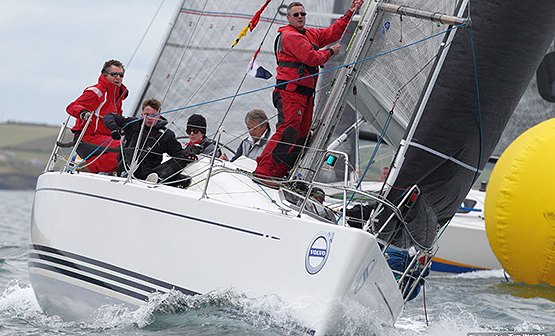 Paul and Deirdre Tingle's X-34 Alpaca from the Royal Cork YC. Photo: Tim Wright
Paul and Deirdre Tingle's X-34 Alpaca from the Royal Cork YC. Photo: Tim Wright
IRC THREE
John Swan's Howth YC team, racing Half Tonner Harmony, had a great start, winning two of today's races and placing second in the last. Harmony has a net points score of just seven for the IRC European Championship, scoring five bullets. Paul & Deirdre Tingle's X-34 Alpaca is second in class, just a point ahead of Patrick Farcy's French team racing, JPK 9.60 Cavok, which finished the day in style, winning the last race.
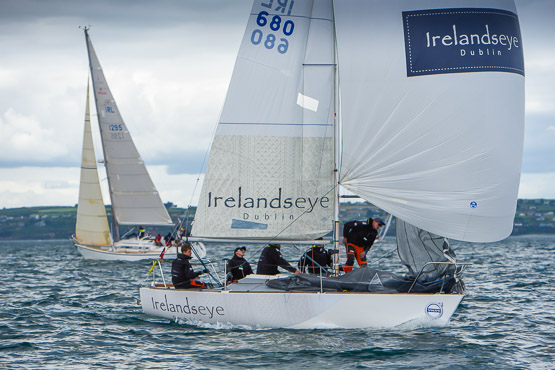 The Howth YC Under 25 team racing J/24 Ireland's Eye Kilcullen Photo: Bob Bateman
The Howth YC Under 25 team racing J/24 Ireland's Eye Kilcullen Photo: Bob Bateman
IRC FOUR
Paul Gibbons' Royal Cork team, racing Quarter Tonner Anchor Challenge, scored two bullets and a second today, to lead the class by a single point from the Howth YC Under 25 team racing J/24 Ireland's Eye Kilcullen. Both teams are very much in the frame for the overall win in the IRC European Championship. Former Royal Cork Admiral Peter Deasy, racing Sunfast 32 Bad Company, with Mark Ivors and Frank Desmond, had a better day at the races, scoring three podium finishes to end the day in third.
Irish Sea yachts Wow (George Sisk) from Dun Laoghaire and Aquelina (James Tyrrell) from Arklow Sailing Club lead a six–boat fleet after three races sailed. In coastal two, Martin Breen's Port of Galway, and Derek Dillon's No Big Deal from Foynes, both Dehler types, lead the six–boat class.
Racing at Volvo Cork Week continues tomorrow with all competitors racing in one of the world's largest natural harbours. Cork Harbour has over 200 miles of coast line with spectacular vistas, including the iconic town of Cobh, which will be a excellent vantage point for race fans.
Day Three photo slideshow below by Bob Bateman
Tight at The Top of Cork Week's Leaderboard
A mix of English, Welsh, Dun Laoghaire, Howth and Cork yachts lead IRC divisions one to four after today's coastal fixture on the second day of racing at Cork Week. Although leaders have established a points cushion in IRC divisons one, two and three, there is still all to play across the near 100–boat fleet as the biennial regatta enters its half way stage tomorrow morning.
In IRC Zero, the TP52 Gladiator leads a three boat turnout by one point from Anthony O'Leary's Ker 39 Antix. In IRC One, the Swansea based Dubois 327 Dark Angel of Tony Ackland continues to lead from East Down's Forty Licks, a First 40 skippered by Jay Colville. Third but on equal points with the Northern Ireland entry is Royal Cork's Jump Juice (Conor Phelan).
There is no change either at the top of the 12-boat IRC 2 division where Royal Irish yacht Rockabill (Paul O'Higgins) now has a ten point lead over Rob McConnell's A35 Fools Gold from Waterford Harbour Sailing Club on 16 points. Third is O'Higgins's club mates Timothy & Richard Goodbody in the J109 White Mischief also on 16 points after four races sailed.
In IRC three, Royal Cork's Paul Tingle was smiling like a Cheshire Cat after today's Coastal Race, as was his wife Deirdre at the helm of X-34 Alpaca. After a race lasting six hours, Alpaca was the top boat in IRC 3 by under three minutes from John Swan's Half Tonner Harmony from Howth Yacht Club.
 Home club challenge – Paul and Deirdre Tingle's X-34 Alpaca from the Royal Cork YC. Photo: Tim Wright
Home club challenge – Paul and Deirdre Tingle's X-34 Alpaca from the Royal Cork YC. Photo: Tim Wright
“It was fantastic absolutely brilliant, ten knots of breeze hugging the shore line after the start, rock hopping all the way against the flooding tide to Big Sovereign and then kite up all the way back but some rain showers came in and sucked away the wind, which was frustrating but not nearly as much as the finish. As we approached Roches Point the wind just died and we must have put in half a dozen tacks up tide to make the finish. The last hundred metres took over five minutes and we thought we might have lost it there. So to come in and find out we won is just amazing, we will be having a glass in the Royal Cork tonight.”
“The young Dublin lads racing Ireland's Eye Kilcullen are a handful, they never give it up"
In IRC four, Royal Cork's Paul Gibbons, racing the quarter Tonner Anchor Challenge, scored an impressive victory in the Coastal Race winning by nearly an hour.
Anchor Challenge, with Cork Olympian Mark Mansfield onboard, now leads IRC Four, which is proving to be extremely competitive as Paul Gibbons explains: “The young Dublin lads racing Ireland's Eye Kilcullen are a handful, they never give it up. Bad Company is always well sailed and the Sigma 33 SeaHawk will be a handful especially when the breeze picks up, so we are taking nothing for granted but we also have one eye on the IRC European Trophy. I believe that after a few more races, it will boil down to four or five boats that can win it and we want to be one of them. Today in the Coastal Race we knew we had to get a good start, if the bigger boats got in front, we would have found it hard to pass them. Beating up the shore was all about staying high and by doing that e avoided tacking, which slowed some of the other boats down. A big win today but we know we have to keep it up, if we are going to win our class and then who knows after that.”
Racing at Volvo Cork Week continues tomorrow with the Beaufort Cup teams joining the faster IRC boats on the Olympic Course southeast of Roches Point. IRC 3&4 and the Sportsboats will tackle the Slalom Course south of Roches Point, whilst all other classes will race in Cork Harbour.
A black tie Gala Dinner for the Beaufort Cup is being held tonight at the Naval Base.
See full results here
Cork Week reporter: Louay Habib
Irish Defence Forces Yacht Wins Beaufort Cup Fastnet Race
The Irish Defence Forces Team, racing the Irish national champion J19 yacht Joker 2, and skippered by Cmdt Barry Byrne, has won the inaugural Beaufort Cup Fastnet Race held as part of Volvo Cork Week.
The 140–mile overnight race was a race from Cork Harbour around the famous West cork rock and back to Cork Harbour.
Racing continues for the Beaufort Cup with three days of inshore racing. The offshore win has put the team in the driving seat to win the prestigious new trophy, and €10,000 for their nominated charity.
“We are over the moon.” smiled Barry Byrne. “Late last night in light airs, most of the fleet compressed together and we gybed out for more wind offshore and got it. From then on we kept our position between the Fastnet and the boats behind to consolidate on that gain and those tactics got us through. But it was a tough fight all the way to the Rock and a tough slog all the way back. We are looking forward to the inaugural Beaufort Cup Gala Dinner tonight, to meet our colleagues from overseas to discuss the challenges to come.”
Minister for Housing, Planning and Local Government, Simon Coveney, was racing on board “Another Adventure,” with the Irish Defence Forces Team in the Beaufort Cup Fastnet Race. Minister Coveney is one of the biggest supporters of the new international services sailing competition, now part of Volvo Cork Week.
“The Fastnet Lighthouse is famous internationally as an iconic symbol of sailing and we felt that it was important to have a race around it to encourage foreigners, in particular, to come and race. This year we are testing the water, so to speak, and it was super.” commented Simon Coveney. “We have 12 teams and six of them went around the Fastnet within five minutes, which is fantastic racing. We have two teams from Britain and another from Northern Ireland and Irish teams from the Defence Forces, Marine Institute,Fisheries Board, the RNLI and the Coastguard. We have promises from lots of other countries who want to come in two years time. What we would like to build over the next few years is the world's largest services event, with top quality racing for services teams from all over the world. The structure will be an offshore race followed by inshore racing and you won't find a better harbour to race than Cork and the coastline is just spectacular. We want people to come and experience the hospitality and competitive racing of Volvo Cork Week. We hope that in the future to cast the net much wider and receive teams from Canada, France, Germany, Spain and Portugal and build on what we have started this year.”
The first Beaufort Cup race around the Fastnet rock for 13–competing boats has until 3pm this afternoon to complete the handicap course.
The yachts departed at 10am from Cork Harbour Naval Base yesterday and last night at around 9pm yachts were closing in on the Fastnet in the 150–mile marathon.
The new military and emergency services regatta – with a first prize of €10,000 – is being run as part of Cork Week and has been enthusiastically embraced by Housing Minister and former Defence Minister Simon Coveney, who promoted the concept of the Beaufort Cup last year.
Coveney joined his brother Patrick on the Greystyones Sailing Club based A35 Another Adventure to enter with a Defence Forces crew.
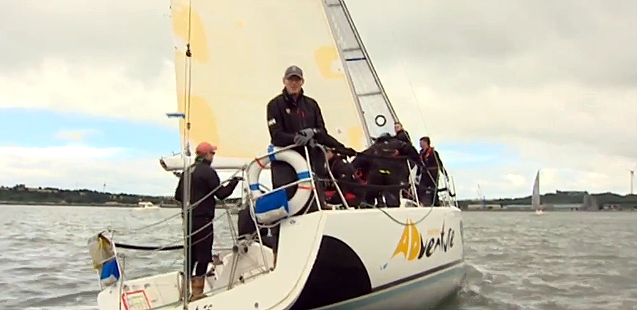 Housing Minister Simon Coveney gives a media interview on his way to the start of yesterday's first race of the Beaufort Cup. Screenshot: TV3
Housing Minister Simon Coveney gives a media interview on his way to the start of yesterday's first race of the Beaufort Cup. Screenshot: TV3
The Irish Defence Forces D team on Merdian and the PSNI on Freya were leading the race as the yachts closed on the lighthouse off Cape Clear, 12 hours after starting off Haulbowline.
Once back in Cork Harbour today, the 13 boats will have a rest day before resuming competition in Class 2 with the rest of the Cork Week 2016 entries.



























